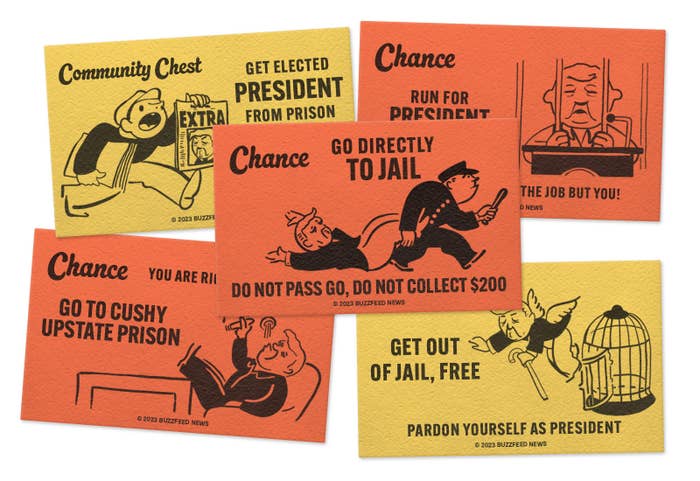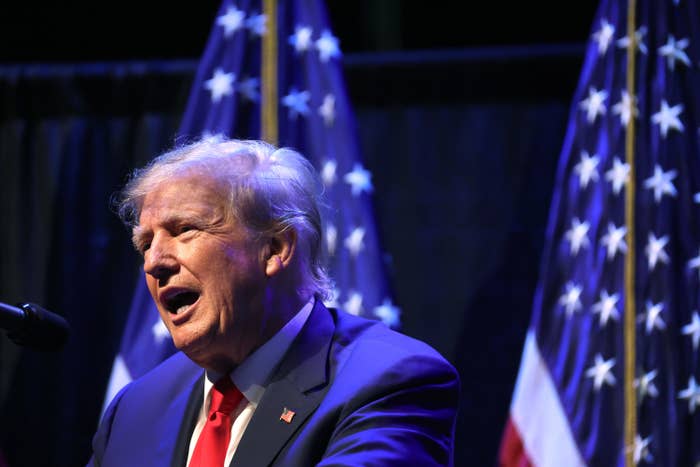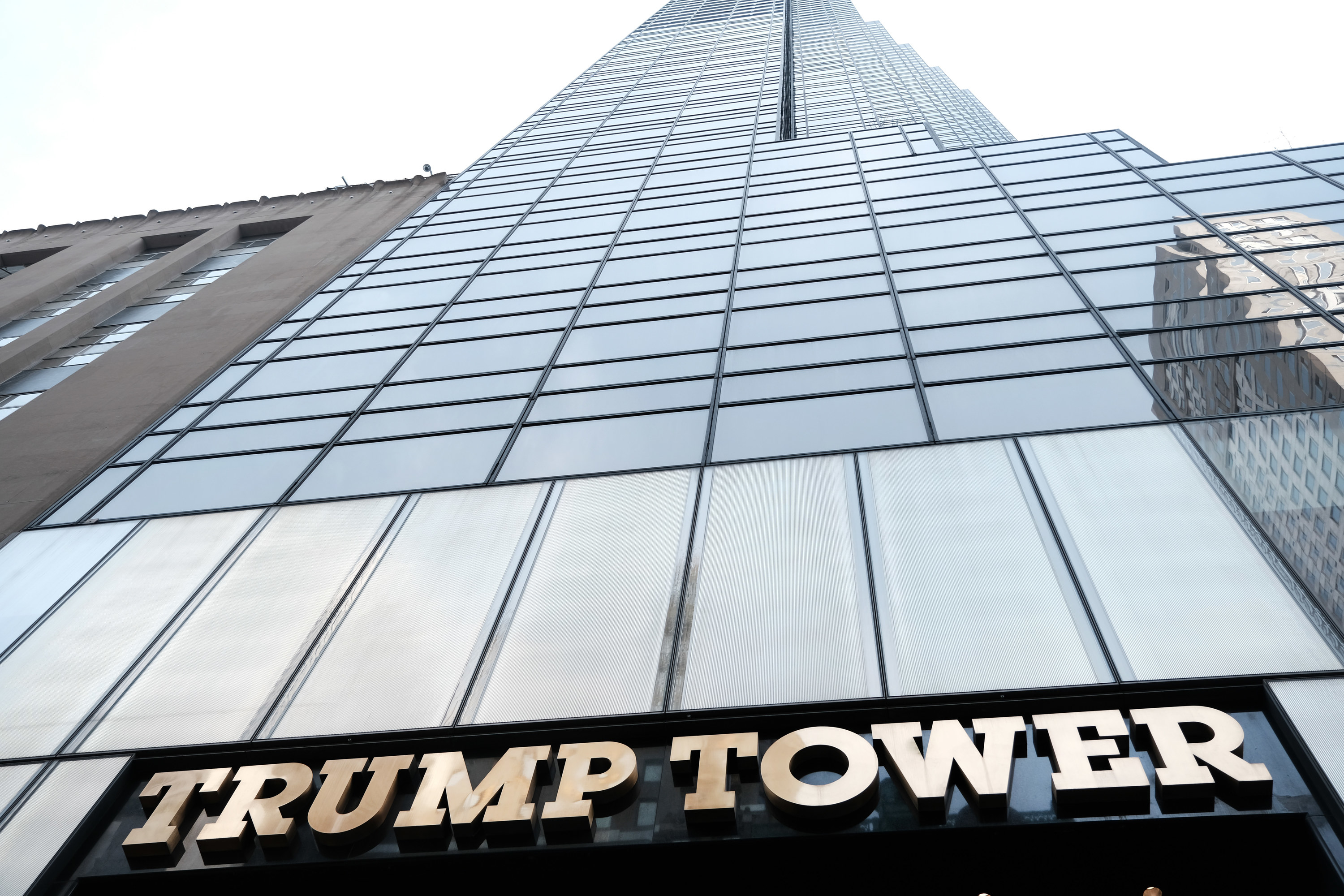
So Donald Trump got indicted. I know, right?! It’s a moment that somehow feels just as shocking as it does inevitable. It’s also completely unprecedented, since no US president has ever officially come under criminal charges until now. You probably have some questions about what this all means: What happens next? Could he actually wind up behind bars? Or will ol’ Donny Trump wriggle his way out of this jam yet again?
We won’t lie, we didn’t know either. But fortunately, here at BuzzFeed News, it’s literally our job to ask people questions and find the answers for our readers. So we called up a bunch of experts, and asked them just about every question you may be wondering about (including the maybe-kinda-silly ones), so you don’t have to. You’re welcome.
Wait, sorry, start at the beginning. What’s actually happening?
Great question. So Trump got indicted — meaning, he was formally charged with a crime — on March 30 for his part in several alleged hush money payments, including one to adult film star Stormy Daniels in the lead-up to the 2016 election. He faces 34 felony counts of falsifying business records in the first degree, to which he pleaded not guilty in Manhattan Criminal Court on Tuesday.
Other charges allege that Trump and others "mischaracterized" documents regarding payments of hush money relating to claims of other affairs. The charges cover allegations of 11 falsified invoices, 12 general ledger entries, and 11 checks.
A little refresher: Daniels, whose real name is Stephanie Clifford, has said she was paid $130,000 to keep quiet about a sexual relationship she claimed to have had with Trump years earlier. Trump denied ever having sex with Daniels. He also initially denied knowing anything about the payment, but later admitted to reimbursing his personal lawyer Michael Cohen for the amount, though he claimed the expense was unrelated to his campaign (we’ll get into that).
Right, right, that whole thing. But what makes that illegal?
In and of itself, paying people off wouldn’t be a crime. But if Trump had falsely logged the transaction — he claimed the payment to Daniels was covered under Cohen’s “monthly retainer” fee — that could constitute falsifying business records, which is a crime under New York state law.
Falsifying business records can be prosecuted as a misdemeanor, or it can be elevated to a felony if prosecutors can show that the records were falsified to conceal criminal wrongdoing. And prosecutors allege Trump was attempting to hide violations of New York state election law, false statements to tax authorities, and campaign contributions exceeding the federal cap. In a news release Tuesday, Manhattan District Attorney Alvin Bragg alleged Trump "went to great lengths to hide this conduct, causing dozens of false entries in business records to conceal criminal activity, including attempts to violate state and federal election laws."
“So that's basically what the former president is looking at in New York,” Cornell law professor Randy Zelin told BuzzFeed News ahead of the release of the charges. It’s the question of if “you falsified the entries in your records, to make it appear that you paid $130,000 in legal fees, when in reality you paid $130,000 to duct tape a porn star's mouth shut.”
Cohen has already served time over his role in the hush payment to Daniels, which he said at his 2018 sentencing he did as an act of “blind loyalty” to Trump. Cohen pleaded guilty to federal charges of campaign finance fraud, tax evasion, and lying to the Senate Intelligence Committee and was sentenced to three years in prison. He was released after just over a year due to concerns with COVID-19 and served the remaining time on house arrest.
Got it. Has Trump said anything about all this yet?
Has he ever. In a rambling, lie-riddled speech from Mar-a-Lago Tuesday night, just hours after he was arraigned, Trump said there was a "very dark cloud over our beloved country," and decried Bragg as a “radical left, George Soros-backed prosecutor" — a less than subtle nod to an antisemitic conspiracy theory.
"The only crime that I have committed is to fearlessly defend our nation from those who seek to destroy it," he said.

So what happens now?
Here’s the wacky thing about ~unprecedented~ times: There’s no damn precedent for them. Even the most preeminent legal minds have about a thousand different opinions on how this could all play out.
“I wish I could read the tea leaves, but there are just so many unknowns here that make it very difficult to predict,” Cheryl Bader, a professor at the Fordham University School of Law, told BuzzFeed News.
So basically, no one knows anything with 100% surety. No certainties, just vibes.
Did Trump get arrested then?
Despite his all-caps social media claim on March 18 that he “WILL BE ARRESTED ON TUESDAY OF NEXT WEEK,” Trump was not arrested that day, or technically any day.
Instead, he voluntarily surrendered on Tuesday to the authorities at Manhattan Criminal Court. He was booked and fingerprinted, but reportedly wasn't mugshotted (and he wasn't handcuffed, like sources told the Guardian he might have wanted to be to lean into the “spectacle” of a perp walk).
“There is a difference between an arrest and a surrender,” Cornell law professor Randy Zelin said. “When you are arrested, it's exactly what it sounds like: Your door gets kicked in at 6 o'clock in the morning, [or] you get pulled out of your office in handcuffs. A surrender is where your lawyer arranges for you to walk into the court or the DA's office or a police precinct under your own power.”
Will there be a trial?
Again, gotta reiterate, this has literally never happened before so it’s hard to say for certain…but according to our legal system, Trump’s case should go to trial like any other case would. That’s unless he took some kind of plea deal, of which Trump’s lawyer said there was “zero” chance.
Even so, it wouldn’t be quite that simple. First of all, even picking a jury wouldn’t be easy, since jurors are expected to be as unbiased as possible, and potential jurors are interviewed ahead of a trial to determine if they hold any preconceptions that could affect their ability to judge a given case objectively. Of course, it’s hard to picture anyone having no previous awareness or opinions about Trump, so jury selection might take a long time. “You can imagine the number of people that will have to be summoned to try to select a fair and impartial jury for a case like that,” said Melissa Redmon, University of Georgia law professor and former prosecutor.
Though it’s hard to imagine what a criminal trial for a former president would look like, one thing is for certain: It would be an absolute circus.
“It will look like a regular trial, but it will be like the OJ trial, or the Scopes Monkey Trial,” said Norm Eisen, senior fellow at the Brookings Institution. “It will be a trial of the century, with all of the panoply and spectacle.”
So…could he go to prison?
He probably won’t. But yeah, he could.
As a misdemeanor, falsifying business records can be punished with up to a year behind bars. But as a felony, as it's being prosecuted in this case, Trump could face up to four years imprisonment.
But in either case, a prison sentence would not be mandatory. If he was convicted, a judge could also sentence Trump to probation, a fine, or community service.
But if you had to wager a guess…
Legal scholars generally agree that Trump going to prison is very unlikely.
“I think there are a lot of hurdles, both legal and political,” UCLA professor and election law expert Richard Hasen said. “And so I don’t think it’s likely, but I think it’s possible.”
But even if he weren’t a former president, a prison sentence wouldn’t be the norm for someone facing comparable charges. “For a nonviolent first offender of his age, probation would be the norm — but I could see why the symbolism here is important to people that Donald Trump is not above the law,” said Columbia Law School professor John Coffee.
That’s not the only way the odds are on Trump’s side. According to a 2017 University of Iowa study, federal judges were found to “frequently sentence well below” guidelines for white-collar crimes, which are disproportionately committed by white men, many of whom are wealthy.
“I would think it would be highly unlikely, just because of the nature of who we believe deserves that harshest punishment of being incarcerated,” Redmon said. “You don't see a lot of white-collar defendants going to prison.”

OK, but if he did. Would it be, like, a normal prison?
Like many convicted of white-collar crime, Trump would probably go to a minimum-security prison. But don’t start picturing country clubs — minimum security prisons are still very much prisons.
“The biggest difference, I would say, is in the nature of the housing, [which might be] a dorm setting versus a cell setting,” Cardozo Law School professor Alexander Reinert said. “But your freedom is still severely restricted while you're in the facility.”
But on the other hand, a minimum-security prison might not be safe enough for such a prominent person. Though numerous high-profile people have served prison time before, it’s hard to argue any come close to Trump in terms of reputation (sorry, Martha). There’d be major questions about his security: Would he need to be held in a special unit, separated from the general population? Would the Secret Service come with him?
“It'd be easier to provide that kind of security and safety in a higher-security prison,” Reinert said.
Since this is a state case, Trump would go to a state facility, which would be chosen by the Department of Corrections. As for the so-called Club Fed facilities where you might picture rich and famous convicts doing time, those are solely for federal crimes, as the tongue-in-cheek nickname implies. Since Cohen was convicted on federal charges, he served his prison sentence in FCI Otisville, which Forbes dubbed one of the “cushiest” prisons in the US.
Trump couldn’t run for president from prison, could he??? COULD HE?!?!
Legally speaking, you bet.
“As long as he is over 35, a natural-born citizen of the United States, and a resident for at least 14 years, and has only served as president once, he's eligible to run for a second term,” Hasen said.
And Trump himself has said that’s the plan. Speaking to reporters at the Conservative Political Action Conference earlier this month, the Hill reported, Trump said he “won’t even think about leaving” the race if indicted, adding that “probably it’ll enhance my numbers.”
If convicted of a felony, he probably wouldn’t be able to vote for himself, though — people who are actively incarcerated are generally ineligible to vote in the US, and only some states allow those convicted of a felony to vote after they’re released.
But could he actually campaign from prison? Well, it’s happened before. In 1920, Socialist Party candidate Eugene V. Debs won 3.4% of the popular vote from a cell in Atlanta Federal Penitentiary, where he was incarcerated on sedition charges for making a speech opposing the World War I draft.
Logistically speaking, it’s harder to say. “He wouldn’t be able to do rallies, there’s lots of people he wouldn’t be able to communicate with, and he wouldn’t be able to meet with fundraisers personally,” Reinert said. “His ability just to communicate with the outside world, even in a minimum security environment, would be significantly restricted — and that’s not even to say about what reputational cost it may have. When I think about all the things the typical presidential candidate has to do, you can do almost none of that if you’re incarcerated.”
There’s also the whole matter of timing. Even if Trump is eventually convicted and sentenced to prison, it would come after a very lengthy trial that has not even begun yet.
“If there is going to be a trial of Donald Trump, I doubt that the trial and all the appeals will be concluded before November 2024,” Eisen said.
Let’s say he won the presidency. Could he then pardon himself?
Not for this case, since these are state charges — presidential pardons can only be granted for federal crimes.
If he were to be convicted on federal charges…no one’s totally sure. Shortly before leaving office, Trump reportedly floated the idea of pardoning himself for potential crimes, the legitimacy of which was the subject of debate by legal scholars. In a 1974 memo, the Department of Justice took the position that a self-pardon would be unconstitutional, but that’s not legally binding.
With no legal precedent for such a move, it’s unclear whether such a pardon would actually hold up. But even if it did, that still wouldn’t be the end of his legal troubles. “If he pardons himself, maybe he would be impeached for doing so and removed from office for abuse of power,” Hasen said.
Trump’s in trouble for a bunch of other stuff too, right?
Right indeed — the New York case is just one of several Trump is facing, though as of early April he has not been charged in any other case.
In Georgia, a grand jury is investigating Trump’s alleged attempt to overturn the 2020 election results. That case is based on a phone call Trump had just days before Biden’s inauguration, during which he threatened and berated Georgia Secretary of State Brad Raffensperger to try and get him to manipulate the state’s election results in his favor. During their chat, Trump begged him to "find" enough votes to help him win. Shortly after the Washington Post published leaked audio of the call, prosecutors in Fulton County, Georgia, opened a criminal investigation into “attempts to influence” the election. In a Truth Social video on March 21, Trump defended the call as “absolutely perfect.”
At the federal level, Trump is also being investigated for his alleged mishandling of classified documents, as well as for his actions related to the Jan. 6 insurrection and alleged attempts to overturn the election.
So no matter what happens with the New York case, Trump is still in some profound legal jeopardy.
“Donald Trump faces the most serious prospect yet — not just of prosecution, but of actual conviction — in his entire half-century-plus career of skirting the edges of the law,” Eisen said. “This may be the time that he finally falls off.”
UPDATE
This story has been updated to include details of the New York charges against Donald Trump.
Correction: A quote from Cardozo Law School professor Alexander Reinert was misattributed in an earlier version of this post.
